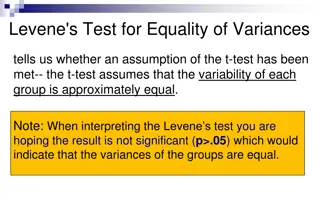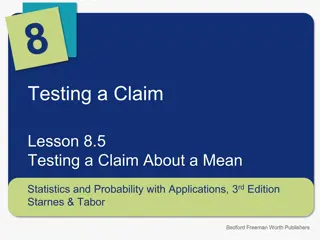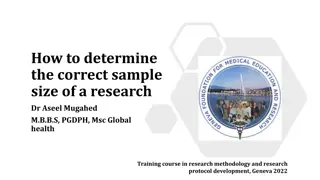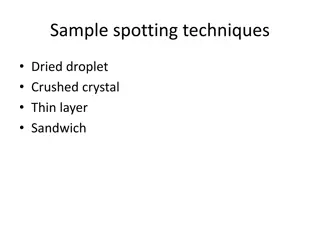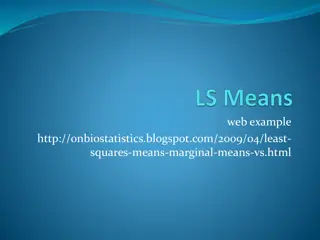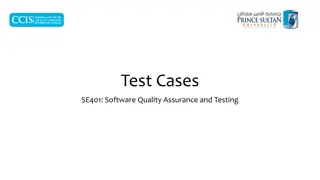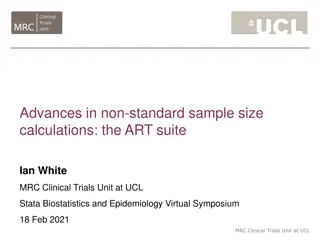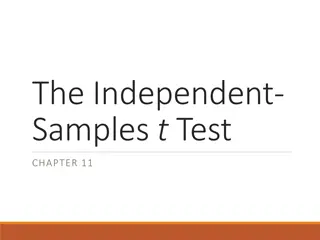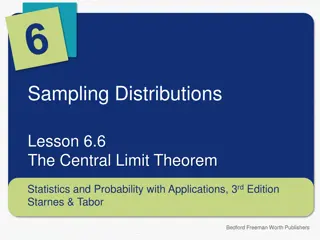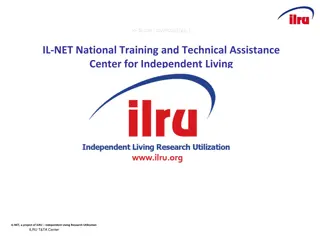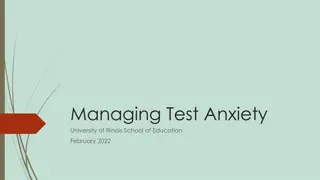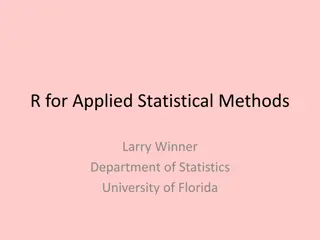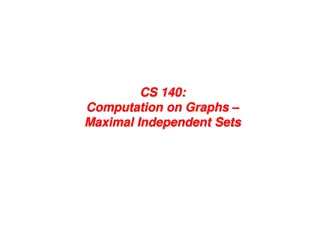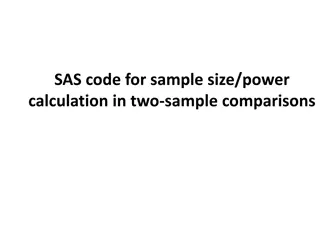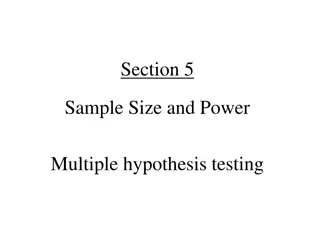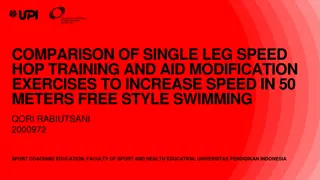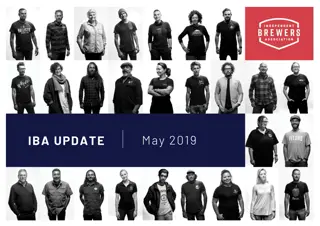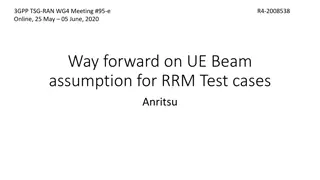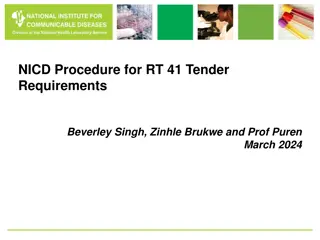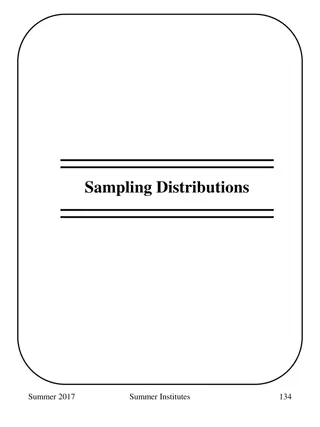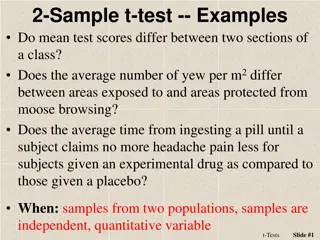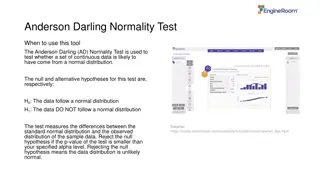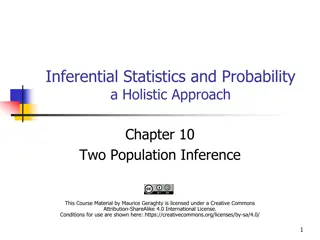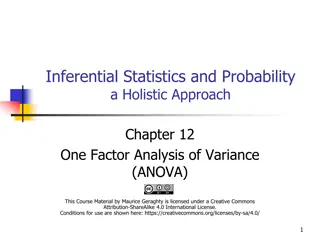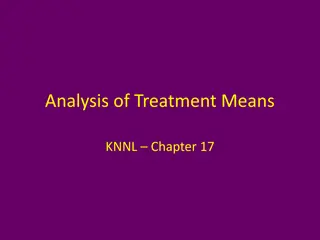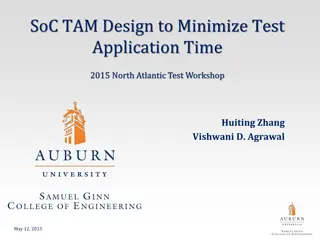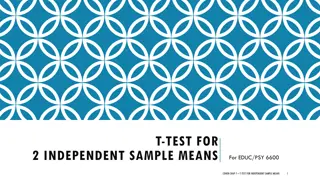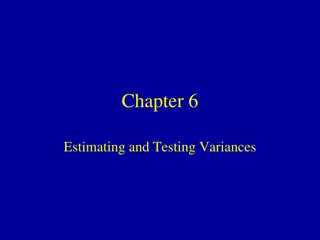Guidance for the training of cervical sample takers
Efficient and accurate cervical screening sample requests are crucial for timely and appropriate patient management. Utilizing the Open Exeter system, sample takers can access pre-populated forms to streamline the process. When deviating from Open Exeter, providing a valid explanation ensures contin
7 views • 13 slides
Enfield Advocacy Services Overview
Enfield Advocacy Services, provided by POhWER, offer various advocacy programs including Independent Care Act Advocacy (ICAA), Independent Health Complaints Advocacy (IHCA), and Independent Mental Capacity Advocacy (IMCA) among others. The services aim to support individuals in understanding and par
1 views • 26 slides
Grade 8 Civics Field Test Administration Overview
The Grade 8 Civics Field Test Administration session conducted by The Office of Student Assessment Services covers various aspects related to the administration of the test, including presenters, logistics, slides, and resources. The agenda includes an overview of the civics field test, SR/PNP detai
0 views • 50 slides
Understanding Statistical Tests: Levene's Test vs. T-Test
Levene's test for equality of variances helps determine if the assumption of equal group variability in a t-test is met. When the result is not significant (p > 0.05), it indicates equal variances. Conversely, the t-test assesses differences between group means. Two examples are provided: one with S
0 views • 4 slides
Understanding the Significance Testing Process for Population Means
Learn how to test claims about population means, including checking conditions, calculating test statistics, finding P-values, and understanding t-distributions and degrees of freedom. This lesson covers the Random and Normal/Large Sample conditions for significance tests, the modeling of standardiz
0 views • 10 slides
Determining Sample Size for Research Studies: Factors and Considerations
Sample size estimation in research is a crucial step that involves various factors such as effect size, population standard deviation, power of the experiment, and significance level. The effect size indicates the practical significance of research findings, with common measures like Cohen's d and P
2 views • 24 slides
Techniques for Sample Spotting in Mass Spectrometry
Learn about different sample spotting techniques including Dried Droplet, Crushed Crystal, Thin Layer, and Sandwich methods used in mass spectrometry analysis. Each technique involves specific steps for preparing and applying samples on a sample plate before analysis. Ideal sample concentrations for
10 views • 6 slides
Effective Strategies for Overcoming Test Anxiety
Learn practical methods to combat test anxiety in this 1-hour workshop by CCAMPIS Kayla Taylor. Topics covered include avoiding test anxiety, preparing effectively for tests, identifying and reducing sources of anxiety, quelling anxiety, test-taking strategies, and stress management. The PASS method
0 views • 13 slides
Understanding Means and LS Means Calculation in Statistics
Explanation of how means and least squares means (LS Means) are calculated in statistics. Describes the process of calculating means for different treatments and centers, as well as deriving LS Means through an iterative process, including handling empty cells.
1 views • 11 slides
Understanding Software Testing: Test Cases, Selection, and Execution
Software testing plays a crucial role in identifying and resolving issues within software products. Test cases, selection, and execution are fundamental aspects of the testing process. Test cases define conditions for testing software functionality, with a focus on repeatability and data specificity
2 views • 36 slides
Advances in Sample Size Calculations for Clinical Trials: The ART Suite
This presentation discusses the importance of sample size calculations in research studies, especially in the context of clinical trials. It covers tools like ART and Power in Stata for binary and categorical outcomes, emphasizing the need to determine the right sample size to ensure research questi
3 views • 35 slides
Understanding Coagulase Test in Microbiology
The Coagulase test is a crucial microbiological method used to differentiate Staphylococcus aureus (Coagulase Positive) from other Staphylococci (Coagulase Negative). By detecting the presence of the enzyme coagulase, this test helps identify pathogenic strains of Staphylococcus that can cause serio
2 views • 28 slides
Understanding Independent Samples t-Test in Statistical Analysis
The independent samples t-test is used to compare means in a between-groups design where each participant is in only one condition. It involves sets of participant scores that are independent, meaning they are completely unrelated to each other. This test helps to determine if there is a significant
1 views • 32 slides
Understanding Grow-Out Test for Genetic Purity Evaluation in Seed Certification
The Grow-Out Test is a crucial measure in seed certification to determine the genetic purity of seed lots. It helps in controlling genetic contaminations and ensuring compliance with prescribed standards. This test is essential for certain species like cotton, castor, musk melon, and brinjal in Indi
0 views • 16 slides
Understanding the Central Limit Theorem in Statistics
This lesson covers the Central Limit Theorem, which states that the sampling distribution of a sample mean becomes approximately normal as the sample size increases, regardless of the population distribution. It explains how the distribution of sample means changes shape and approaches a normal dist
1 views • 7 slides
IL-NET: Training and Technical Assistance for Independent Living
IL-NET, a project of ILRU, provides training and technical assistance for independent living centers. The presentation covers creating and maintaining consumer files, Information and Referral processes, consumer signature requirements, Independent Living Plans, evaluation feedback, accessibility rem
0 views • 25 slides
Making the Move to Independent Housing in Northern Virginia
Explore the journey to independent housing with the Northern Virginia Housing & Supportive Services Regional Implementation Team. Discover the choices and responsibilities that come with independent living through interactive games and insights into success stories. Learn about the offerings, respon
0 views • 26 slides
Managing Test Anxiety Tips for Success in Illinois Licensure Exam
Successfully passing the Illinois licensure test requires not only content knowledge but also effective test-taking strategies and managing test anxiety. This guide provides valuable tips on addressing test anxiety before the exam, including putting things in perspective, recalling past successes, u
0 views • 14 slides
The Role of Independent Directors in Corporate Governance: A Critical Evaluation
The role of independent directors in corporate governance is critically evaluated in this content, addressing the effectiveness and limitations of independent boards in addressing governance issues. The history and rise of independent directors, empirical research on their effects, and the importanc
0 views • 31 slides
Empowering Nevadans with Disabilities: The Nevada SILC Mission
The Nevada State Independent Living Council (SILC) advocates for empowering individuals with disabilities to live independently in the community. Their mission focuses on promoting the philosophy of independent living and maximizing leadership, empowerment, and inclusion. The Council is federally fu
0 views • 14 slides
HIV Rapid Test Procedures and Instructions
This content provides detailed instructions for conducting HIV rapid tests using three different kits: Determine HIV-1/2 Rapid Test, Uni-Gold HIV-1/2 Rapid Test, and Bioline HIV-1/2 Rapid Test. The instructions include steps such as specimen collection, test device preparation, result interpretation
0 views • 5 slides
Overview of 2-Sample t-tests for Statistical Analysis
This content provides detailed information on conducting 2-sample t-tests for statistical analysis, including independent samples and test of equal variances. It covers test statistics, hypothesis testing, model assumptions, and practical examples using data from NBA and WNBA players. The material i
0 views • 29 slides
Computation on Graphs: Maximal Independent Sets
The content discusses the concept of maximal independent sets in graph theory. It defines independent, maximal, and maximum sets, highlighting the difficulty in finding a maximum independent set due to its NP-hard nature. Sequential and parallel algorithms for finding maximal independent sets are pr
0 views • 12 slides
SAS Code for Sample Size and Power Calculation in Two-Sample Comparisons
SAS code snippets are provided for conducting power and sample size analyses in two-sample comparisons using the TWOSAMPLEMEANS statement. The code covers scenarios such as two-sample t-tests assuming equal variances, unbalanced designs, unequal variances, and more. Examples and syntax are included
1 views • 10 slides
Understanding Sample Size, Power, and Hypothesis Testing in Statistics
Sample size determination based on estimation precision and confidence interval width is crucial in statistical analysis. By calculating the necessary sample size, researchers can ensure sufficient standard errors and confidence intervals. Additionally, the relationship between power and sample size
1 views • 50 slides
Comparison of Single Leg Speed Hop Training and Aid Modification Exercises for Improving Speed in 50m Freestyle Swimming
This study examines the impact of single leg speed hop training and modified aid exercises on enhancing speed in 50m freestyle swimming. The research involves two groups undergoing specific training methods over 12 sessions within a week. Results discuss the descriptive statistics, normality test, h
0 views • 7 slides
Update on May 2019 IBA Activities
The May 2019 update by IBA includes information on market trends, independent beer industry growth, the rollout of the Independent Seal, important events like Good Beer Week, and valuable resources for members. Key points include a decline in total beer consumption, significant growth in the indepen
0 views • 20 slides
Update on UE Beam Assumption for RRM Test Cases in 3GPP Meetings
The latest developments in 3GPP meetings regarding UE beam assumption for RRM test cases are outlined. Discussions include the need for UE beam type assumptions, updates to test cases for FR2, and upcoming presentations focusing on specific test cases and beam assumptions per test group. Test purpos
0 views • 9 slides
NICD Procedure for RT-41 Tender Requirements and Evaluation of HIV Rapid Test Kits
The NICD provides detailed tender requirements for professional kits and self-test kits to meet technical specifications. Suppliers must adhere to pre-screen suitability criteria, provide evidence of independent evaluation by recognized agencies, possess necessary certifications, submit regulatory v
0 views • 14 slides
Understanding the Key Distinctions in Statistics
In statistics, the crucial difference between sample and population data shapes how we interpret information and draw conclusions. By generalizing sample data to the population, statisticians can estimate true means and variances with confidence. Sample means help us infer about the population, alth
0 views • 32 slides
Understanding 2-Sample t-Test Examples
The 2-sample t-test is used to determine if mean scores differ between two groups in various scenarios, such as comparing test scores in different sections, yew density in moose browsing areas, or headache pain relief with different treatments. Key steps include formulating hypotheses, calculating t
0 views • 13 slides
Understanding the Anderson-Darling Normality Test
Conducting the Anderson-Darling Normality Test helps determine if a set of continuous data follows a normal distribution. The test involves comparing the sample data distribution with a standard normal distribution and evaluating the p-value to either accept or reject the null hypothesis. By collect
0 views • 5 slides
Comparing Population Means: Inference Study
This chapter delves into comparing two population means using various statistical models such as independent sampling and dependent sampling. It covers methods like the two-sample Z-test, pooled variance t-test, and unequal variances t-test. Additionally, it discusses the concept of a random variabl
0 views • 41 slides
Understanding One Factor Analysis of Variance (ANOVA)
One Factor Analysis of Variance (ANOVA) is a statistical method used to compare means of three or more groups. This method involves defining factors, measuring responses, examining assumptions, utilizing the F-distribution, and formulating hypothesis tests. ANOVA requires that populations are normal
0 views • 23 slides
Understanding Parameters, Statistics, and Statistical Estimation in Statistics
In statistics, we differentiate between parameters and statistics, where parameters describe populations and statistics describe samples. Statistical estimation involves drawing conclusions about populations based on sample data. The Law of Large Numbers explains the relationship between sample stat
0 views • 12 slides
Statistical Analysis of Treatment Means in Experimental Studies
The content discusses various statistical methods to analyze treatment means in experimental studies, including KNNL models, main effects plots, inference for individual treatment means, comparing two treatment means, and contrasts among treatment means. It covers topics such as parameter estimation
0 views • 25 slides
Simulation-Based Tests for Comparing Multiple Means
Simulation-based tests provide a method for comparing multiple means by assuming no association between explanatory and response variables. Null distributions are created by shuffling data and calculating differences in means. The observed differences in sample means are then compared to the null di
0 views • 45 slides
Efficient Design Strategies for Minimizing Test Application Time in SoC
This paper discusses innovative design approaches to minimize test application time (TAT) in System-on-Chip (SoC) testing. It addresses challenges in incorporating hardware and power constraints into SoC test scheduling, focusing on test access mechanism (TAM) design and test scheduling strategies.
0 views • 23 slides
Introduction to Independent Sample Means T-Test in Educational and Psychological Research
Independent Sample Means T-Test is a statistical analysis used to compare the means of two independent groups to determine if there is a significant difference between them. This test is commonly used in educational and psychological research to assess the effectiveness of interventions or treatment
0 views • 21 slides
Understanding Estimating and Testing Variances in Statistical Analysis
Estimating and testing variances is crucial in statistical analysis. Population and sample variances are key measures of squared deviations around the mean. Sampling distribution of sample variances, specifically for normal data, follows a Chi-Square distribution. Understanding Chi-Square distributi
0 views • 31 slides



